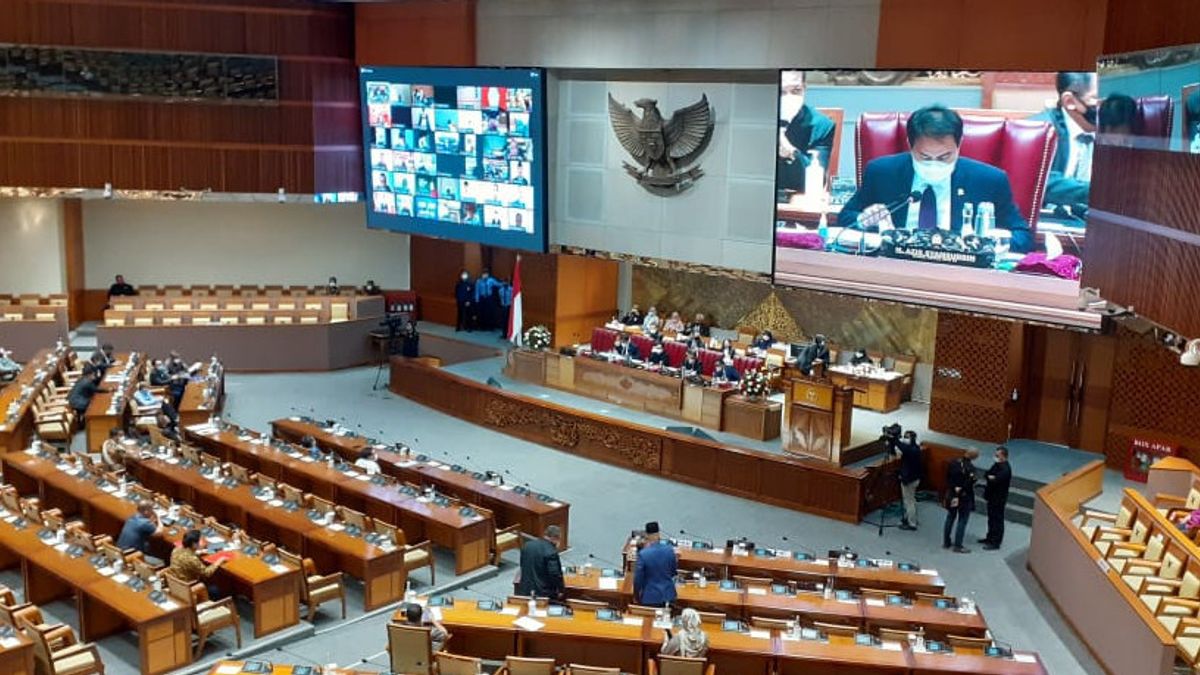JAKARTA - President Joko Widodo (Jokowi) asked people who were dissatisfied with the Omnibus Law on Job Creation to submit a judicial review to the Constitutional Court (MK). It's just that, according to Andalas University constitutional law expert, Feri Amsari this is in vain.
According to him, Jokowi's request for the public to propose a judicial review is tantamount to trapping them into his circle of power. He is not even sure that the Constitutional Court will decide wisely because he thinks this institution has just received a prize from the government.
"The president is trapping the public into the presidential circle of power. The constitutional justices have just been awarded a long term of office from the president and the DPR, even though both parties are litigants in the filing of this law," Feri told reporters, Monday, October 12.
The meaning of the prize by Feri is that the revision of the Constitutional Court Law was passed on September 1 by the Indonesian Parliament and President Jokowi signed this decision on September 28.
In the revised law, there is a change in the terms of office of the chairman and vice chairman. If in the previous period, the chairperson and deputy chairperson had their term of office limited to two years and six months, now, based on the new regulation, they can serve for five years according to Article 4 Paragraph 3.
In addition, the revision of the Constitutional Court Law also regulates that the current constitutional judges can continue to carry out their duties for up to 70 years as long as the entire term of service is not more than 15 years.
So, seeing these conditions, Feri assessed that it would be in vain when later there were people who submitted a judicial review. "It is impossible for the Constitutional Court not to return the president's favor," he said.
Even though he said it would be in vain, he considered that there was indeed a procedural flaw in the process of making it up to the ratification of the Job Creation Law. This defect is evident from not even sharing the draft law with faction members.
"So from the start, it must be shared, right? The principle of forming a Law is based on the principle of transparency as regulated in Article 5 letter g of Law Number 12 Year 2011. So the procedural defects are severe," he said.
[/ read_more]
Previously, Didi Irawadi Syamsuddin, a member of Commission XI DPR from the Democrat Party faction, made a statement regarding this procedural flaw. According to him, there were a number of irregularities in the process of ratification of this law, including the unavailability of manuscripts that would be distributed to each faction on the grounds that there was not enough time to print them.
In addition, there are other irregularities in the process of ratifying the Work Creation Omnibus Law that Didi alluded to, namely regarding meeting invitations. According to him, the invitation was odd because it was distributed only a few hours before the event started. So, it would be very impressive if this plenary session was forced.
"Whereas if you look at the previous agenda, the meeting is scheduled for October 8. Suddenly it will become October 5, without sufficient and adequate information," he said.
Moreover, the reason for the leadership of the DPR to speed up the meeting was because many members had contracted COVID-19 that made no sense. Supposedly, if the reason is that, the trial should be postponed first until everyone is ready to follow it.
"The decision of the plenary session of the Ciptaker Bill was heretical and flawed in procedures," he said.
It is known, in his press conference, President Jokowi said that the demonstration that took place on Thursday, October 6 occurred because of the large amount of disinformation and hoaxes circulating regarding the Job Creation Law. He also gave a number of explanations related to this law, including emphasizing that this law would not be detrimental to workers because none of their rights were abolished.
Furthermore, he also asked all parties who disagreed with the Omnibus Law on Cipta Kerja to submit a judicial review to the Constitutional Court (MK). Not holding a demonstration that ended in chaos.
"If there are still parties who are dissatisfied with the Job Creation Law, please submit a judicial review to the Constitutional Court (MK)," Jokowi said as quoted from Youtube of the Presidential Secretariat, Jakarta, Friday, October 9.
According to him, the judicial review step to the Constitutional Court is regulated in the Indonesian constitutional system. "Our constitutional system does regulate that. If anyone is not satisfied, please submit a judicial review," said Jokowi.
[/ read_more]
The English, Chinese, Japanese, Arabic, and French versions are automatically generated by the AI. So there may still be inaccuracies in translating, please always see Indonesian as our main language. (system supported by DigitalSiber.id)










